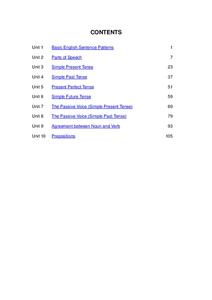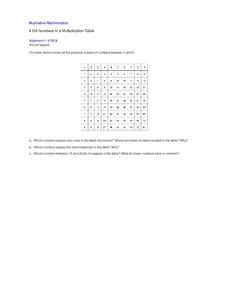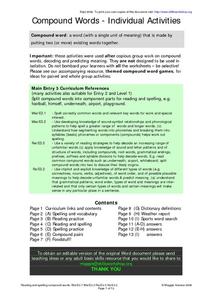Curated OER
Identifying Text Structure
Work on identifying text structure with this thorough learning exercise. After studying a diagram depicting six different text structures (compare/contrast, spatial, chronological, problem and solution, cause and effect, and order of...
Curated OER
Poems: Identifying Patterns
Here is a great learning exercise that contains two short poems to compare and contrast. Children will read each poem out loud and then complete three comparative analysis questions which focus on rhyme, structure, and language. Note:...
EngageNY
The Structure of Ratio Tables—Additive and Multiplicative
Build tables by understanding their structure. Scholars take a closer look at the structure of ratio tables in the 10th segment in a 29-part series. Individuals realize that the tables can be built using an additive or multiplicative...
Curated OER
Basic English Sentence Patterns
A simple set of practice sheets deals with sentence structure and patterns. The 117-page packet includes 10 units of skills, varying from identifying parts of speech in a sentence to writing the correct part to make a sentence complete....
Curated OER
Patterns in the Multiplication Table
Explore patterns in the multiplication table in order to deepen your third graders' understanding of this essential skill. Implement this activity as a whole-class lesson plan, allowing students to work in pairs or small groups to...
Illustrative Mathematics
Numbers in a Multiplication Table
Identifying patterns is a crucial skill for all mathematicians, young and old. Explore the multiplication table with your class, using patterns and symmetry to teach about square numbers, prime numbers, and the commutative and identity...
Curated OER
Solving Polynomial Equations
This worksheet and tutorial explores solving more complex polynomials by graphing each side separately and finding the point of intersection, identifying the sum and differences of cubes, and solving higher degree polynomials by using...
Inside Mathematics
Conference Tables
Pupils analyze a pattern of conference tables to determine the number of tables needed and the number of people that can be seated for a given size. Individuals develop general formulas for the two growing number patterns and use them to...
Winterhill School
Poetry Analysis
Gain greater insight into poems using a poetry analysis learning exercise. Here, scholars follow steps and answer questions to dissect any poem. Topics include the poem's meaning, theme, technique, and structure, as well as personal...
Illustrative Mathematics
Kitchen Floor Tiles
An interesting way to look at the kitchen floor is to count the number of tiles in the border. Fred starts with four white floor tiles and writes an expression for the number of tiles needed for the colored border. Algebra learners are...
It's About Time
Plate Boundaries and Plate Interactions
How does the Earth continually repair itself? Explore the answer to this question, and others, with a unit on plate boundaries and interaction. Pupils classify the types of movement at plate boundaries and identify the distribution of...
Curated OER
Lewis Structures
In this Lewis structures worksheet, students identify and describe what Lewis structures or dot diagrams are and how they illustrate the valence electrons in an outer shell. Then they use a periodic table to determine the numbers of...
Agile Mind
Transforming Graphs of Quadratic Functions
In the activity on this webpage, learners use interactive graphing technology to investigate transformations of graphs. In the first part of the task, they look at the graph of a quadratic function with coordinates of a few points...
Noyce Foundation
Boxes
Teach your class to think outside the box. Scholars use the concept of equality to solve a problem in the assessment task. They determine how to use a scale to identify the one box out of a set of nine boxes that is heavier than the others.
It's About Time
How Atoms Interact with Each Other
Connect the dots and assist young chemists as they demonstrate covalent and ionic bonding. Class members use their knowledge of valence electrons to predict compound formulas as they arrange electrons into various bonding structures to...
Curated OER
Viruses and Bacteria
A series of questions about archaebacteria and eubacteria reinforce a chapter on viruses and bacteria. This worksheet is from chapter 18 of an unspecified textbook, but could work with your biology lecture as well. High schoolers...
Curated OER
Periodic Table Basics 2
In this periodic table instructional activity, students create cards for a annotated periodic table then use it to answer 16 short answer and fill in the blank questions.
Curated OER
Sentence Fragments, Run-ons, and Combining Sentences
For this set of grammar worksheets, students identify sentence fragments, revise run-on sentences and fragments, and combine sentences by inserting words and phrases.
Inside Mathematics
Graphs (2006)
When told to describe a line, do your pupils list its color, length, and which side is high or low? Use a worksheet that engages scholars to properly label line graphs. It then requests two applied reasoning answers.
Curated OER
Compound Words - Individual Activities
In these compound word worksheets, students engage in numerous activities to reinforce what they have learned about compound words. Nine worksheet provide various means of reinforcing the concept including word puzzles and...
Curated OER
Reviewing the Romance
In this reviewing the romance worksheet, learners research the secrets of writing a romance. Students read at least 20 modern romance novels. Learners identify the structure around the story, looking at plot and characters and style of...
Inside Mathematics
Population
Population density, it is not all that it is plotted to be. Pupils analyze a scatter plot of population versus area for some of the states in the US. The class members respond to eight questions about the graph, specific points and...
Inside Mathematics
Snakes
Get a line on the snakes. The assessment task requires the class to determine the species of unknown snakes based upon collected data. Individuals analyze two scatter plots and determine the most likely species for five additional data...
Inside Mathematics
Squares and Circles
It's all about lines when going around. Pupils graph the relationship between the length of a side of a square and its perimeter. Class members explain the origin in context of the side length and perimeter. They compare the graph to the...

























